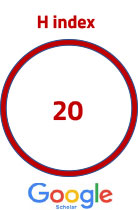| Acceptance rate | 46% |
|---|---|
| Time to first decision | 6 months* |
| Time to decision with review | 50 days* |
*Approximate number of days
**The days mentioned above are averages and do not indicate exact durations. The process may vary for each article.
ACTA Pharmaceutica Sciencia
2022 , Vol 60 , Num 3
Could the increase in oxidative stress be the reason for the increased polyamine levels in diabetic obese and non-diabetic obese patients?
1 Department of Medical Biochemistry, Institute of Health Sciences, Istanbul Medipol University, Istanbul, Turkey2 Department of Medical Biochemistry, Medical School, Istanbul Medipol University, Istanbul, Turkey
3 Department of Nutrition and Dietetics, School of Health Sciences, Istanbul Medipol University, Istanbul, Turkey
4 Department of Medical Statistics and Medical Informatics, Medical School, Istanbul Medipol University, Istanbul, Turkey
DOI : 10.23893/1307-2080.APS.6020 Viewed : 11401 - Downloaded : 2701 Putresin, spermine, and spermidine are important polyamines found in all living organisms. In this study, as a first in the literature, we aimed to investigate polyamines levels and their relationship with oxidative stress in obese adults. The study was carried out with 85 obese patients and 29 healthy controls. Glucose, HbA1c, urea, uric acid, CRP, Total antioxidant status and Total oxidant status putrescine, spermine and spermidine levels were analysed. The study found putrescine and spermidine levels in obesity (0.25 ±0.13) (2.29 ±0.79) were found to be significantly lower, respectively, than the control group (0.38± 0.08) (1.80 ± 0.68) (p<0.05). It was observed that both OSI and TOS values in the diabetic obese group were statistically higher than both the control group and the non-diabetic obese group. As a result; although polyamine levels are low in obesity, increased oxidative stress in the diabetic obese group caused an increase in polyamine levels. Keywords : Polyamines, obesity, diabetes mellitus, oxidative stress





